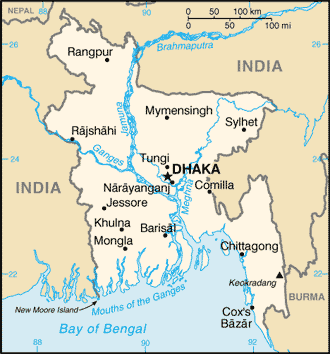The second phase of the oral cholera vaccination drive began today to provide an additional dose of the vaccine to children of newly arrived Rohingya population against the deadly diarrheal disease. The children are also being administered oral polio vaccine.

Image/CIA
Nearly 180,000 children aged between one and five years are expected to receive the second dose of oral cholera vaccine (OCV), while around 210,000 children up to the age of five years will be vaccinated against polio in a six-day immunization campaign in Ukhia and Teknaf sub-districts of Cox’s Bazar and Naikhanchari in Bandarban district.
The campaign is being conducted by The Ministry of Health and Family Welfare (MoHFW) with support from WHO, UNICEF, International Centre for Diarrhoeal Disease Research, Bangladesh, IOM, UNHCR and local and international NGO’s.
“These large scale immunization drives against cholera and polio reflect the commitment of the health sector to take all possible measures to protect the health of these vulnerable population,” Dr. N. Paranietharan, WHO Representative to Bangladesh, said. “Children being among the most vulnerable, the vaccination campaign is an important and commendable effort of the Ministry of Health and Family Welfare and health partners”, he added.
The previous oral cholera vaccine campaign, launched on 10 October, covered 700 487 people aged one year and above, 176 482 of them children aged one to five years. 900 000 doses of oral cholera vaccine were mobilized following a risk assessment conducted by MoHFW, with the support from WHO, UNICEF, IOM and Médecins Sans Frontières (MSF), in late September. The International Coordinating Group (ICG) on vaccine provision released OCV within a day of the Bangladesh government’s request, while GAVI, the Vaccine Alliance, provided financial support.
Earlier, in a rapidly organized vaccination campaign for measles, rubella and polio, 72 334 children up to five years of age were administered oral polio vaccine between 16 September to 4 October.
Providing a second dose of cholera and polio vaccines is essential to ensure protection for children against these diseases.
“The second dose of the oral cholera vaccine will provide better protection to this deadly disease to children” says Edouard Beigbeder, UNICEF Representative in Bangladesh. “The second phase is critical to them and also protect them against polio.”
170 teams comprising public workers, volunteers from international organizations, NGOs and newly arrived communities have been mobilized to carry out the latest cholera and polio campaign.
WHO and UNICEF have trained the teams, each comprising two vaccinators, a record-keeper and two Rohingya volunteers who are tasked with mobilizing their communities for vaccination.
While immunisation is essential in preventing cholera, a water-borne disease, the effort must be supplemented with access to clean drinking water, proper sanitation conditions and hygiene measures.
UNICEF has scaled up its interventions and communication on safe practices and WHO is closely monitoring the incidence of water-borne diseases through early warning, alert and response emergency surveillance system, ensuring continuous water quality surveillance in camps, settlements and households. Both WHO and UNICEF are prepositioning critical supplies for case management.
Related:


One thought on “Cholera, polio vaccination drive enters 2nd phase for Rohingya population at Cox’s Bazar”